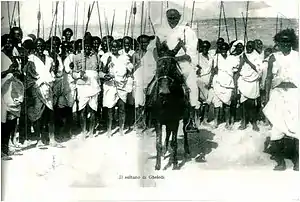Osman Ahmed
Osman Ahmed (Somali: Cismaan Axmed, Arabic: عثمان أحمد) was a Somali ruler. He was the fifth and final Sultan of the Geledi sultanate.
| Osman Ahmed عثمان أحمد | |
|---|---|
| 5th Sultan of the Geledi sultanate | |
 Sultan Osman Ahmed (mounted) & his soldiers | |
| Reign | 1878–1910 |
| Predecessor | Ahmed Yusuf |
| Successor | (End of Sultanate) |
| Born | Afgooye, Geledi Sultanate |
| Died | 1910, Italian Somaliland |
| Dynasty | Gobroon Dynasty |
| Religion | Islam |
History
Osman Ahmed is considered less illustrious than his predecessors,[1] and Gobroon power weakened considerably under his rule. He was the son of Sultan Ahmed Yusuf and succeeded his father after his death.
Peace treaty with Bimaal
Sultan Osman did not want to repeat the same mistake as his father and grandfather and decided to make peace with the Bimaal clan. He lifted sanctions against Merca and allowed them to serve the hinterland which boosted wealth between the Sultanate and the city-state. Sultan Osman was praised for creating peace in South Somalia.[2]
Battle of Luuq
The British, Italians, and Ethiopians partitioned Greater Somalia into spheres of influence, cutting into the previous nomadic grazing system and Somali civilizational network that connected port cities with those of the interior. The Ethiopian Emperor Menelik's Somali expedition, consisting of an army of 15,000 men, made a deep push into the vicinity of Luuq in Somalia. However, his troops were soundly defeated by the Sultanate of the Geledi, with only 200 soldiers returning alive and were heavily traumatized. The Ethiopians subsequently refrained from further expeditions into the interior of Somalia but continued to attack the people in the Ogaden by plundering the nomads of their livestock numbering in the hundreds of thousands.[3]
Battle of Xudur
Many Somalis were somewhat willing to join and/or support the Dervish Army led by Mohammed Abdullah Hassan simply because of his anti foreign stance. Sultan Osman and many other leaders in the South Somalia regions had begun opening diplomatic channels for negotiation with the Dervish. Despite mutual admirations, negotiations foundered due largely to the Gobroon Dynasty and others distrust of the Dervish as a result of the Dervish army slaughtering Maay speaking people and the personal feud assassination of Sheikh Uways al-Barawi|Uways Al Barawi]] by the Dervishes, Uways was a prominent Sheikh in the region. Over 30,000 soldiers from almost all the Maay speaking tribes led by Sultan Osman inflicted a stunning defeat and repelled the Dervish from all Geledi Sultanate's territory. This defeat and, the British and the soldiers of Haaji Waraabe ("Haji the Hyena") striking the Dervish settlements in the North Somalia had ended the reign of the Dervish and Mohammed Abdullah Hassan.[4]
Treaties with Italians
He signed treaties to the Italians for protectorate in 1908 for his possession of territories he controlled like Jubbaland, Bakool, Bay, Lower Shebelle and Benadir. After his death in 1910, the Kingdom ended. However, Uways al Barawi from Barawa was not happy with the agreement and organised an Ikhwaan leading the Banadir revolt, but it was crushed by Italian forces in 1908.[5]
See also
Notes
- Cassanelli, p.149.
- Gundel, Joakim (2006). The predicament of the 'Oday': The role of traditional structures in security, rights, law and development in Somalia. Danish Refugee Council & Novib/Oxfam. p. 28.
- Divine madness: Moḥammed ʻAbdulle Ḥassan (1856-1920) page 69
- Divine madness: Moḥammed ʻAbdulle Ḥassan (1856-1920) page 83
- Mukhtar, Mohamed Haji (25 February 2003). Historical Dictionary of Somalia. p. 210. ISBN 9780810866041. Retrieved 2014-02-15.
References
- Cassanelli, Lee Vincent (1973). The Benaadir past : essays in southern Somali history. University Microfilms International.
- Luling, Virginia (2002). Somali Sultanate: the Geledi city-state over 150 years. Transaction Publishers. ISBN 0-7658-0914-1.
| Preceded by Ahmed Yusuf |
Geledi sultanate | Succeeded by End of Sultanate |